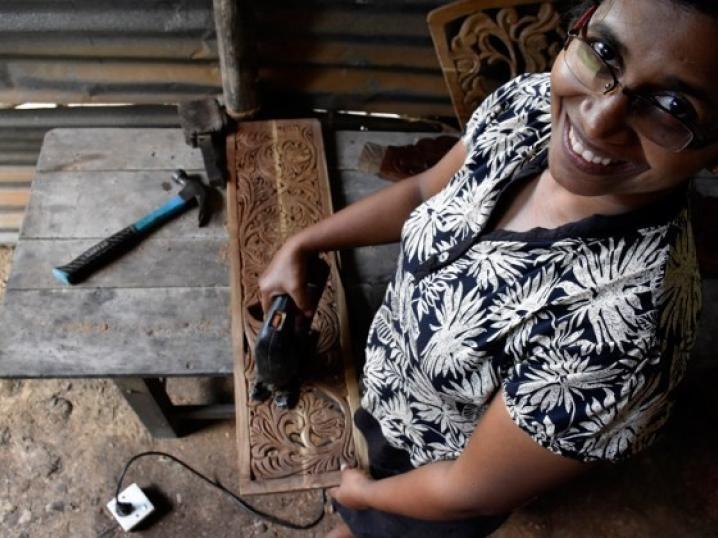Microfinance Empowers Female Entrepreneurs: 7 Stories

In celebration of International Women’s Day, VisionFund is sharing inspiring stories of female entrepreneurs we work with. We support them with financial services to create livelihoods, and they, in turn, are making positive changes in their communities. Be inspired!

Wijayangani from Sri Lanka studied art in school and has turned her woodworking passion into a business. Microfinance loans from VisionFund helped her set up a workshop and buy the necessary tools. Her next purchase is a machine to help her carve the wood, which she currently does by hand. It takes her nearly four hours to carve a single panel of wood. “I used to do art in school,” she says, and she has now found a way to transfer that passion to earn an income and help her family.

Zonia is grateful for the integrated work of World Vision and VisionFund in Bolivia. Microfinance loans and business training helped her set up a small farm to grow her rabbits, guinea pigs and cattle. She now runs a successful business, and is able to provide well for her family of four children.

Cecile, a single-mother of three from Rwanda, belongs to a microfinance group of 10 members. VisionFund loans helped Cecile improve her grocery shop, and she in turn invested her profits in becoming a mobile-banking agent. Her life has changed — she used to struggle to put food on the table, and now she can afford to provide for her three children.

Reina from Honduras started growing coffee to support her five children when her husband left them some years ago. With the help of microfinance loans and a lot of hard work, she is one of the most successful coffee producers in her community and is also the founder and president of a growing women’s cooperative dedicated to selling roasted and ground coffee.

Yu Yu Maw from Myanmar used to work in the paddy fields as a day labourer making $2.28 a day. When her only daughter fell ill, Yu Yu needed a way to grow her income to pay the clinic fees. She became part of a women’s savings group and took out a small loan to start a broom re-selling business. Now, she has created her brooms and her production line has changed from one type of broom to five different styles, and her brooms are not only functional but also beautiful pieces of craftsmanship.

Mother of two, Tran Thi Than from Vietnam used to collect bamboo shoots and medical herbs in the forest and also do manual labour to provide for her family. Microfinance loans helped her set up a more stable source of income – animal husbandry and growing sugar cane – and her business now provides seasonal jobs for her community. Her entrepreneurial endeavours were recognised at the 2018 Citi Micro-entrepreneurship Awards.

Baasanpagam used to work for one of the biggest bakeries in Mongolia. “Thanks to a VisionFund loan, I opened my own bakery by purchasing a bread making oven. With my second loan, I built a heating system,” she says. Two years on, her bakery went onto become one of the three biggest in her community and she runs it with the full support of her husband.
With a little help, women entrepreneurs create livelihoods that not only provide income but bring to life inherent talents and skills. At VisionFund, 70% of the over 1.2 million global clients we serve are women. With the right financial knowledge and support, they continue to create positive change within their families and communities.